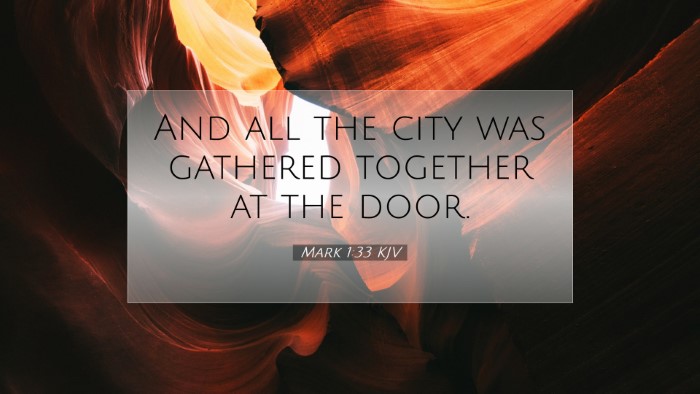Commentary on Mark 1:33
"And all the city was gathered together at the door." - Mark 1:33
Introduction
This passage occurs in the early stages of Jesus' ministry, where He begins to attract significant attention due to His miraculous works and authoritative teaching. Mark 1:33 captures a pivotal moment demonstrating the eagerness and desperation of the people of Capernaum as they seek relief from suffering.
Contextual Background
In the preceding verses, Jesus has performed notable miracles, including casting out demons and healing Simon's mother-in-law. The implications of His actions lead to widespread fame and a growing crowd eager for healing and teaching. This verse serves as a culmination of that early interest and the social dynamics at play.
Insights from Matthew Henry
Matthew Henry notes that in this verse, we observe not only a physical gathering but also a spiritual hunger among the people. The entire city gathering at the door signifies a collective need for healing and deliverance. Henry emphasizes the magnetic draw of Christ’s compassion and power, urging those in need to come forth. The multitude's response reflects a realization of their own helplessness and the hope they find in Jesus.
Insights from Albert Barnes
Albert Barnes approaches this verse with a focus on the implications of the crowd's actions. He observes that the phrase "all the city" points to a broad appeal of Jesus's ministry. He remarks on the nature of people who come to Jesus—those afflicted with various ailments and those burdened by sin. Barnes argues that this gathering reflects a deeper spiritual truth: just as the people of Capernaum sought Jesus, so are believers called to seek Him as the source of healing and hope. Moreover, it serves as a foreshadowing of the ongoing conflict between Christ’s mission and societal expectations.
Insights from Adam Clarke
Adam Clarke provides a thorough historical and cultural analysis of the scene depicted in Mark 1:33. He reminds readers of the intensive social pressures and needs faced by the populace in Capernaum. Clarke elaborates on the desperation felt by the sick and possessed, indicating that they came seeking aid from the only One who could help them. He emphasizes the importance of community—how collective suffering drove individuals to seek support together. Clarke’s insights highlight how Jesus’ availability to the masses underscores His mission to engage with humanity's plight.
Theological Implications
This verse holds profound theological themes, including:
- Jesus as the Healer: Mark 1:33 exemplifies Jesus’ role as a compassionate healer. The crowd's gathering reflects both their faith in His ability to meet their needs and the attributes of God as a healer.
- The Nature of Crowds: The dynamics of the crowd can represent the mixed motives behind seeking Jesus. While many sought healing, it raises questions about the nature of faith and the conditions driving people to Christ.
- Societal Response: The passage prompts reflection on how society reacts to the message of Christ today. Are modern individuals gathering at the doors of the church seeking healing and truth, or are they lost in apathy?
Application for Ministry
This verse is rich with insights for modern pastoral ministry and teaching. It encourages ministers to remember the importance of being available and responsive to those seeking help. The example of Jesus drawing the crowd invites pastors to create environments where people feel welcome to come with their burdens. More importantly, this passage calls for an ongoing commitment to engage with the community, addressing both physical and spiritual needs in a holistic approach.
Conclusion
Mark 1:33 reveals the transformative impact of Jesus' ministry and the urgent longing of humanity for healing. The scripture offers timeless lessons for believers, scholars, and theologians on the nature of Christ’s compassion as well as the necessity of communal support in spiritual journeys. As we reflect on this verse, we are reminded to actively engage with the needs of those around us, just as Christ did, fostering an environment of hope, healing, and community.


